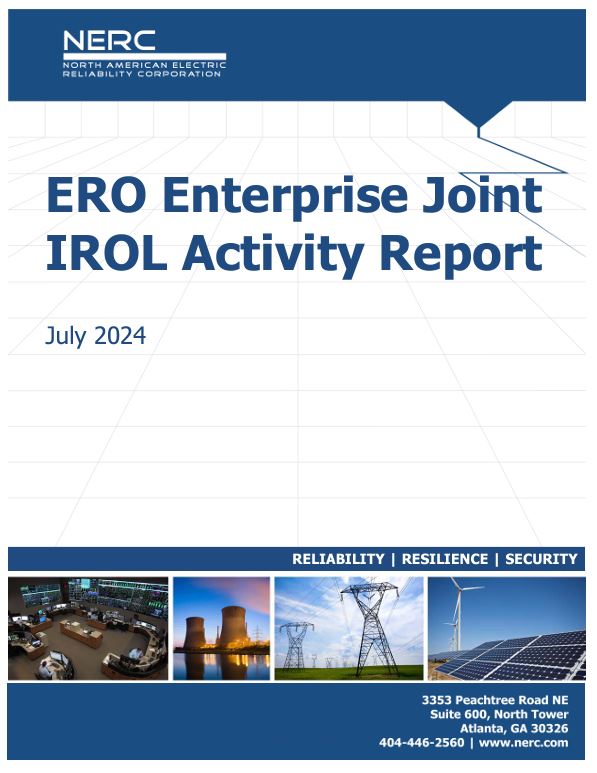
Interconnection Reliability Operating Limits (IROLs) are a subset of System Operating Limits (SOL) in which reliable operation of the bulk power system (BPS) may result in instability, uncontrolled separation, or cascading outages if the limit is exceeded. To better understand how Reliability Coordinators (RCs) have incorporated lessons learned and good utility practices into SOL methodology for the purpose of determining IROLs, a joint ERO Enterprise IROL Activity Team was formed. In July 2024, NERC published the ERO Enterprise Joint IROL Activity Report to help provide more comprehensive guidance around establishing and managing IROLs.
The Joint IROL Activity Report was initiated as a follow up to work performed by the NERC Project 2015-09 Establish and Communicate System Operating Limits (SOL) Standards Drafting Team, the Methods for Establishing IROLs Task Force (MEITF), and NERC’s petition-based commitment to evaluate whether and how RCs have revised their methods for establishing IROLs in response to the Reliability Guideline Methods for Establishing IROLs.
The NERC Reliability Standards did not provide a specific list of criteria within System Operating Limit (SOL) methods necessary to evaluate the establishment of IROLs. This resulted in Planning Coordinators (PCs) and RCs developing differing criteria or thresholds to identify an IROL designation.In late 2015, the Project 2015-09 Standard Drafting Team was formed to develop revisions to certain standards with the purpose of providing greater clarity and consistency in the establishment of SOLs and IROLs. In addition to the drafting team, the NERC Standard Committee also formed the MEITF to develop technical material to be used as an industry reference to enhance IROL establishment.
These efforts, however, did not result in the needed modifications to the Facilities Design, Connections, and Maintenance (FAC) standards. As part of the initial filing for Project 2015-09, NERC committed in its June 2021 Petition for Approval of Proposed Reliability Standards Related to Establishing and Communicating SOLs to assessing the current state of IROLs and the apparent discrepancies implemented by RCs in SOL development. To meet this commitment, NERC established a joint review team that consisted of staff from NERC and the Regional Entities and initiated an IROL review activity in late 2021. It is important to note that this was not a compliance activity, but rather an effort to better understand current and ongoing practices and procedures regarding methods for establishing IROLs and providing industry with additional guidance.
Throughout 2022, the review team engaged in virtual discussions with 16 of the 17 entities performing RC functions on the BPS. All three RCs in the MRO footprint participated in the discussions. The review involved comprehensive conversations with the participating RCs to gain insight into their unique approaches for establishing and managing IROLs, as well as their familiarity with recommended practices outlined in the Reliability Guideline Methods for Establishing IROLs. Through this activity, the review team determined that the reliability guideline resulted in minimal impact (as only two of the sixteen participating RCs implemented “some” of the recommended practices), and an extremely high level of inconsistency still exists among RCs regarding approaches to establishing IROLs.
The IROL Activity Report includes detailed information on six topic areas related to IROLs. Each topic area includes the following subsections: Introduction, Observations, Conclusions, Recommendations, and Beneficial Practices. The six topic areas addressed are as follows:
- Terminology
- Establishing IROLs
- IROL-Like Conditions
- Tools and Practices
- Communication and Coordination
- Reliability Standards
The IROL Activity Team noted wide variations among the participating RCs relative to terminology, philosophies, approaches, and methodologies for establishing IROLs. The team believes that this absence of clarity around IROLs poses a reliability risk that must be addressed. There were eleven recommendations that came from the IROL Activity Report, including:
- RCs should include or consolidate all IROL methodology documents in a single SOL methodology document or binder to ensure that they are easily referenced, compared, and updated.
- RCs should assemble a team of subject matter experts to explore the possibility of developing one or multiple common high-performance analysis tools that can be implemented by all RCs in real-time.
- The ERO Enterprise should resolve industry confusion around IROLs by modifying the body of Reliability Standards to improve clarity.
While there is a need for operator flexibility to manage unique grid systems, the need for consistency also exists to ensure BPS reliability. This report is meant to promote best practices across North America and enhance the reliability, resilience, and security of the BPS.
More information on the Project 2015-09 and MEITF can be found in the links below.
Project 2015-09 Establish and Communicate System Operating Limits
Methods for Establishing IROLs Task Force (MEITF)
– Dianlong Wang, MRO Principal Reliability Assessment Engineer